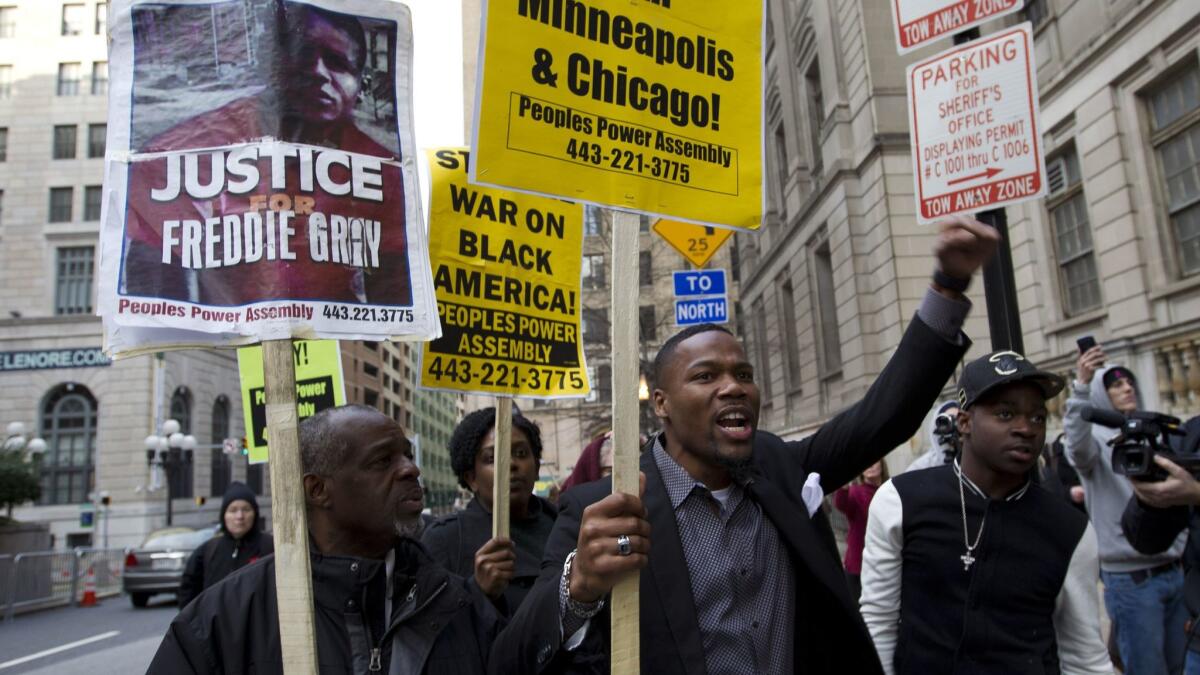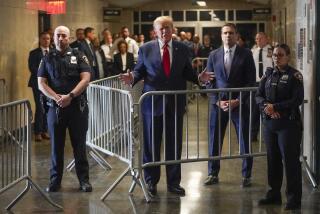Judge denies Justice Department request for pause in Baltimore consent decree case

- Share via
Reporting from Baltimore — A federal judge on Wednesday denied the U.S. Department of Justice’s request for a 90-day pause in the Baltimore consent decree case, calling it “untimely” ahead of a scheduled public hearing Thursday — which will now proceed.
U.S. District Court Judge James K. Bredar said the federal government’s request to cancel the hearing “at the eleventh hour would be to unduly burden and inconvenience the Court, the other parties, and, most importantly, the public.”
The hearing has been scheduled since mid-February. The Justice Department asked for the continuance in the case at the close of business on Monday.
It was not immediately clear what Bredar’s order means for the future of the police reform agreement.
He did not address the broader argument in the Justice Department’s request for a continuance, that top officials in the new Trump administration needed more time to review the proposed deal, which was struck in the waning days of the Obama administration.
A Justice Department spokesman declined to comment on Bredar’s ruling Wednesday.
Baltimore Mayor Catherine Pugh said Wednesday that her administration is prepared for the hearing.
Pugh said she hopes federal government lawyers hear the concerns of Baltimore’s citizens about the need for a consent decree imposing strict outside oversight of the police in order to prevent civil rights abuses.
“Criminal justice reform is something we must do in our city,” the mayor said. “When they hear from the citizens tomorrow, they’ll get a flavor of why this is important.”
The Justice Department’s motion cited President Trump’s executive order in February calling on the department “to prioritize crime reduction” and Atty. Gen. Jeff Sessions’ formation of a task force to ensure that the agency is using its resources to push that agenda.
The consent decree was negotiated after President Obama’s Justice Department conducted a sweeping investigation of the Baltimore Police Department following the 2015 unrest after Freddie Gray’s death from injuries suffered in police custody. The agency said it found a pattern of unconstitutional and discriminatory policing in the city, particularly in poor, predominantly black neighborhoods.
Ian D. Prior, a spokesman for the Department of Justice, said the request for a delay did not mean Sessions opposes police reform.
“The attorney general agrees with the need for police reform and the need to rebuild public confidence in law enforcement in Baltimore,” Prior said. “Permitting more time for the department to examine the proposed consent decree will help ensure that the best result is achieved for the people of the city and ensure that the BPD can carry out its mission of fostering trust with community members, safeguarding life and property, and promoting public safety through enforcing the law in a fair and impartial manner.”
Bredar avoided the Justice Department’s broader arguments for the pause, focusing his order on the inconvenience the cancellation of Thursday’s public hearing would pose to the public.
“The primary purpose of this hearing is to hear from the public; it would be especially inappropriate to grant this late request for a delay when it would be the public who were most adversely affected by a postponement,” Bredar wrote.
He also wrote that the Justice Department offered “no real prejudice to them if the hearing proceeds as scheduled.”
In February, Bredar had issued a separate order scheduling the public hearing for Thursday and setting out how it would work.
According to that order, anyone interested in speaking at the hearing will be allowed to sign up. The hearing will begin at 9:30 a.m. and last until 5 p.m., with “occasional breaks.” After counsel for the city and the Justice Department are given an opportunity to speak, members of the public will be given three minutes each to make their statements, in the order they signed up, the order says.
The court will only be hearing comments about whether the consent decree is “fair, adequate, and reasonable and is not illegal, the product of collusion, or against the public interest,” the order says. All speakers must give their name and, if applicable, the organization they represent. Organizations may only have one representative speak.
While the court “hopes to hear from all who sign up,” the hearing will end at 5 p.m. regardless of whether everyone who signed up to speak has been heard.
Pugh and other top Baltimore officials have pledged to move forward with reform the city’s Police Department whether or not the Department of Justice pursues its pending consent decree with the city.
The mayor said, however, that having a legally binding court order will help the public have confidence in the reform and bolster her case for obtaining outside money to fund new technology and training for the police department.
Pugh said she is working with members of Maryland’s congressional delegation to seek federal funding for police reform.
“Our federal delegation is ready to move forward to seek funds for us,” Pugh said. “For the civilian community, having that consent decree in place gives them confidence.”
Broadwater and Rector write for the Baltimore Sun.
More to Read
Sign up for Essential California
The most important California stories and recommendations in your inbox every morning.
You may occasionally receive promotional content from the Los Angeles Times.












